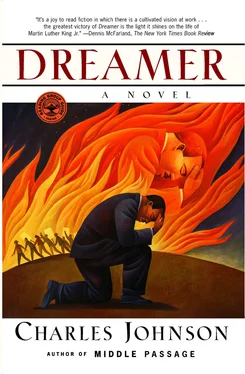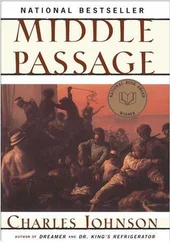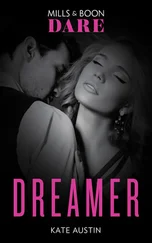“You hear what I said?” he asked. “Can we get served?”
Arlene was still staring. “I guess I can wait on you.” She had one of those roosterish, unmusical American voices, coarsened by years of smoking Camel straights, full of cracks and cackle. “The owner, he’s not here. Are you …”
“Am I what?”
She pointed toward the newspaper in front of the old man, who was swabbing his wet crotch with a fistful of napkins, to a front-page, above-the-crease photograph of King in a Chicago poolroom surrounded by admiring teenagers as he leaned over the green felt of a pool table, lining up the cue for his shot. Arlene said, “Him. Is that you ?”
“No.” Abruptly, he was very quiet.
“Really? You look just like him.”
“I’m not him,” Smith said angrily, and the saying of it seemed to knock the wind out of him, as if he’d been asked that a thousand times, and each time whoever asked was disappointed, making him feel like an impostor, less than the real McCoy. He lifted one of the leather-bound menus stacked on the counter next to displays of candy and fresh pies, and studied it as the old man, dripping, scurried out. Arlene continued to gawk at us.
“I want four specials for me’n my friends, to go. You got a bathroom here?”
“Outside, around the back. You know, I almost asked for your autograph—”
“You still want it?”
“Well, if you were him , I might, but—”
Smith walked out before she finished.
Arlene blinked, pushing a limp, lawless lock of hair, dampened by the heat, off her forehead with the back of her hand. “Did I say something wrong?”
“No,” I said, “he’s just sensitive about his looks.”
“Well, the way he left, you’d think I called him a name. He does look like that colored preacher, the one causin’ all the big to-do up in Chicago. I wanted his autograph ’cause he’s in the paper all the time, but that don’t mean I like how he’s stirrin’ things up. I get along with colored just fine, but that Dr. Coon—”
“King,” My stomach heaved. “His name is King.”
“Whatever, I just think he’s pushin’ things too fast.” She took a deep breath. “You go ’head and sit down. I can serve you since you’re gonna take it out. I’ll have your order in a minute.”
She stepped to the freezer, took out four hamburger patties that looked as if they’d just thrown off a lingering illness, and dropped them into a skillet on the grill. My belly was still knotted. I’d wanted to slap her, but I remembered how my mother told me to behave in public, and how polite and civilized and patient the minister was himself — always a credit to the race — when confronting white people with an I.Q. the size of their shoes. I tried not to hate her. At the spot where she’d been leaning on the counter when we entered there was a copy of a movie star magazine beside a pack of cigarettes and an ashtray packed with butts bearing the imprint of incisors I’d noticed were stained brown by nicotine when she opened her mouth. In fact, she’d tried to keep her hand over her mouth when speaking to conceal an overbite and the tartar and decay on her front teeth. With her back to the counter, I could see a blemish on her neck from cheap, dimestore jewelry.
I closed my eyes, both hands resting on my lap. Smith’s words in the car ran through my head, then the memory of trips my mother and I made to visit relatives in South Carolina when I was young fell through my heart like rain. I remembered roadside cafés like this diner, where we stopped hungry and tired after seven hours of driving and were told we could be served only if we went to the back entrance. Another image rose up: badly lit department stores near my relatives’ homes in Abbeville where they enjoyed the privilege of purchasing clothes like other citizens from the pale, blond salesgirls but could not try them on their bodies before the sale was made, as if their skin was unclean, corrupt in some way, and might contaminate or blemish with the ancient stain of blackness these cheap garments off the rack. All this my mother accepted, and she never corrected the teenage employees when they called her “girl,” which even then made my thoughts turn murderous with hate and humiliation, as an incident King experienced in 1944 brought him “perilous close” to despising white people when during his college days he was seated behind a curtain on a dining car, a shade pulled down to obliterate entirely the offensiveness of his presence. And so he rode behind a screen, trapped within their ideas of his identity, his blood pressure soaring, which meant even his health and the risk of myocardial infarction was at the mercy of people he despised, and he could do no more to change this than my mother who, dragging me in tow, tramped through mud around the café to the kitchen door, where we waited for what seemed hours, listening to the laughter and voices of customers and the clatter of dishes and silverware inside. I remembered that my mother’s expression was sad but stoic as she looked into the distance with her chin lifted, both hands folded in front of her, and I saw that for me she would suffer a thousand indignities and denials of her personhood so that I would not go hungry, dying this way every day, one little piece at a time, in order to wrest from the world not great victories but the most pathetically simple items for survival — hand-me-down clothes from the women whose houses she cleaned and the plate of food wrapped in foil the café’s waitress at last brought to us, handing it to my mother with a self-satisfied smile as if she’d done something good and noble that day, a compassionate deed her pastor would praise come Sunday, because she had not turned us away but instead fed the coloreds, the grendels, through the back door, not cast us out as some would, which was unchristian, but consigned us to a more benign phantom realm east of Eden where we were, if not fully human, half-men and half-women: poor, damned creatures scratching at her kitchen door like cats for a bowl of milk. (Wasn’t that how JFK had once described blacks, as “poor bastards”?) And for this meal, this phantom nourishment, my mother gave her money, said God bless you —I remember her blessing them — then back inside her car as we continued south she made me eat every morsel for which she had so dearly paid.
Arlene placed our food on the counter, her lips compressed, as Smith came back from the bathroom, and rang up the bill. “That’s four dollars and fifty cents.”
I handed her a five-dollar bill. She placed it in the cash register, then scooped out my change. I thrust my palm toward her for the coins, and had perfect control of myself, the magnanimity and external calm my mother had insisted upon, and which the Movement’s leaders so nobly embodied, until she slapped the money on the counter, and something inside me (I don’t know what) snapped (I don’t know how), flooding me with a hatred so hot, like a drug, I was nearly blinded by it as I threw the food in her face, hurled from the counter sugar canisters and ketchup bottles smashing against the wall behind the grill, screaming so loud and long my glasses steamed; then, as Arlene fled toward the rear of the diner, I stormed outside to the car, Smith right at my heels.
He was grinning. “Very nice. You were vicious, Bishop. I think your best line was calling her an insignificant, execrable bitch mired in the booboisie — that’s from Mencken, right?”
“I said that?”
“Oh, yeah,” he cackled. “And more. You left her toasted, roasted, and with an apple in her mouth. It was choice. You sounded like William F. Buckley on bad acid. I always knew it’d be sweet to see a black intellectual go ballistic.”
Читать дальше












